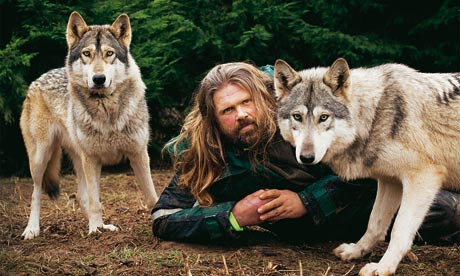http://www.guardian.co.uk/lifeandstyle/2011/jan/15/i-lived-with-wolves

Like most young children, I grew up with an innate fear of wolves. It wasn't until I was a bit older and saw a wolf in a zoo that I realised how far away this animal was from the mythological creature I'd learned about in books and films.
I grew up in a small village in Norfolk and was always interested in the natural world and wild animals. I knew I wanted to work with them in some way when I was older. In my 20s, I read about an American naturalist, Levi Holt, who ran a wolf research centre in Idaho and I thought, "That's where I want to go." I sold everything I had and raised enough money for my plane fare. When I met up with biologists working on the reservation, they took me on as a basic field biologist, teaching me how to track wolves and collect data for them.
Even though the other biologists and scientists thought it was dangerous, I soon wanted to get closer to the wolves really to understand their behaviour. I couldn't help wondering, "Could a human become part of their family?" If I could, I thought, imagine what information I could share.
After a year or two of working for the centre and getting to know the area – a rugged, mountainous landscape covered in forest – I moved to the wild. The first time I got up close to a wolf, within around 30 metres, any fear I had quickly turned to respect. I stayed in a den area, a remote spot where wolves look after their young, and very soon one pack began to trust me. I lived with them day and night, and from the start they accepted me into their group. I ate what they ate, mostly raw deer and elk, which they would often bring back for me, or fruit and berries. I never fell ill and my body adapted quickly to its new diet. It's easy to look back and think, "What horrible food", but when you haven't eaten for a week, it looks appetising.
I couldn't hunt, but I soon became useful looking after the younger ones. I would spend days sitting outside the den, observing their behaviour and trying to make sure they kept out of danger.
I stayed with the same pack for over a year, watching pups grow to adulthood. I never missed human contact during that time.
I felt a tremendous sense of belonging with the wolves. Whenever I began to think about my old life, I would quickly switch my thoughts back; in terms of survival, I had constantly to focus on my new habitat. Although I didn't see anyone, there were people back at the reservation and I had a rendezvous point where I could leave messages if I felt I was in danger. I was only ever truly scared on two occasions: once, when all the wolves were feeding, I ate the wrong piece of meat – there is a strict hierarchy of who eats what part of an animal – and one of the wolves leapt on me in seconds because of my mistake. He took my entire face in his mouth and started to squeeze hard. I could feel the bones in my jaw begin to bend, and in that split-second I realised how vulnerable I was and how restrained they were most of the time.
The other time, I wanted to get a drink from the stream and one of the wolves stopped me dead in my tracks, growling, snarling and nipping me. I thought, "This is the end, he's going to finish me off." An hour or so later, he started to lick my face and we both went to the stream for a drink. There I saw evidence of recent bear tracks and droppings, and I realised this was why he guarded me. I would almost certainly have been killed but, more importantly, my tracks would have led back to their young, so it was for their protection.
Eventually I had to leave; I had lost so much weight and looked gaunt and worn after a year . Life expectancy in that sort of environment was short and I felt it was time to come back to society. Returning to the world was a tremendous culture shock, but I knew I could do a lot with the knowledge I'd acquired. I now run a centre in Devon that helps wild and captive wolves, and offers educational courses. I want to show people that wolves aren't savage and ruthless – they are balanced and trustworthy creatures that place their family above all else.
• As told to Fiona Clampin.
No comments:
Post a Comment
Reply to message